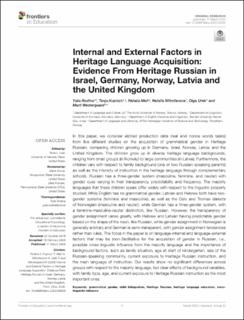| dc.contributor.author | Rodina, Yulia | |
| dc.contributor.author | Kupisch, Tanja | |
| dc.contributor.author | Meir, Natalia | |
| dc.contributor.author | Mitrofanova, Natalia | |
| dc.contributor.author | Urek, Olga | |
| dc.contributor.author | Westergaard, Marit | |
| dc.date.accessioned | 2020-06-10T07:45:28Z | |
| dc.date.available | 2020-06-10T07:45:28Z | |
| dc.date.created | 2020-03-11T16:42:16Z | |
| dc.date.issued | 2020 | |
| dc.identifier.citation | Frontiers in Psychology. 2020, 5 (20), | en_US |
| dc.identifier.issn | 1664-1078 | |
| dc.identifier.uri | https://hdl.handle.net/11250/2657441 | |
| dc.description.abstract | In this paper, we consider elicited production data (real and nonce words tasks) from five different studies on the acquisition of grammatical gender in Heritage Russian, comparing children growing up in Germany, Israel, Norway, Latvia, and the United Kingdom. The children grow up in diverse heritage language backgrounds, ranging from small groups (in Norway) to large communities (in Latvia). Furthermore, the children vary with respect to family background (one or two Russian-speaking parents) as well as the intensity of instruction in the heritage language through complementary schools. Russian has a three-gender system (masculine, feminine, and neuter) with gender cues varying in their transparency, predictability and frequency. The majority languages that these children speak differ widely with respect to the linguistic property studied: While English has no grammatical gender, Latvian and Hebrew both have two-gender systems (feminine and masculine), as well as the Oslo and Tromsø dialects of Norwegian (masculine and neuter), while German has a three-gender system, with a feminine-masculine-neuter distinction, like Russian. However, the transparency of gender assignment varies greatly, with Hebrew and Latvian having predictable gender based on the shape of the noun, like Russian, while gender assignment in Norwegian is generally arbitrary and German is semi-transparent, with gender assignment tendencies rather than rules. The focus in the paper is on language-internal and language-external factors that may be (non-)facilitative for the acquisition of gender in Russian, i.e., possible cross-linguistic influence from the majority language and the importance of background factors, such as family situation, age at start of kindergarten, size of the Russian-speaking community, current exposure to Heritage Russian instruction, and the main language of instruction. Our results show no significant differences across groups with respect to the majority language, but clear effects of background variables, with family type, age, and current exposure to Heritage Russian instruction as the most important ones. | en_US |
| dc.language.iso | eng | en_US |
| dc.publisher | Frontiers Media | en_US |
| dc.relation.uri | https://www.frontiersin.org/articles/10.3389/feduc.2020.00020/full?&utm_source=Email_to_authors_&utm_medium=Email&utm_content=T1_11.5e1_author&utm_campaign=Email_publication&field=&journalName=Frontie | |
| dc.rights | Navngivelse 4.0 Internasjonal | * |
| dc.rights.uri | http://creativecommons.org/licenses/by/4.0/deed.no | * |
| dc.title | Internal and External Factors in Heritage Language Acquisition: Evidence from Heritage Russian in Israel, Germany, Norway, Latvia and the UK | en_US |
| dc.type | Peer reviewed | en_US |
| dc.type | Journal article | en_US |
| dc.description.version | publishedVersion | en_US |
| dc.source.volume | 5 | en_US |
| dc.source.journal | Frontiers in Psychology | en_US |
| dc.source.issue | 20 | en_US |
| dc.identifier.doi | https://doi.org/10.3389/feduc.2020.00020 | |
| dc.identifier.cristin | 1801195 | |
| dc.relation.project | Senter for grunnforskning: CAS 2019/2020 MultiGender | en_US |
| dc.relation.project | Norges forskningsråd: 250857 | en_US |
| dc.description.localcode | Copyright © 2020 Rodina, Kupisch, Meir, Mitrofanova, Urek and Westergaard. This is an open-access article distributed under the terms of the Creative Commons Attribution License (CC BY). The use, distribution or reproduction in other forums is permitted, provided the original author(s) and the copyright owner(s) are credited and that the original publication in this journal is cited, in accordance with accepted academic practice. No use, distribution or reproduction is permitted which does not comply with these terms. | en_US |
| cristin.ispublished | true | |
| cristin.fulltext | original | |
| cristin.qualitycode | 2 | |

